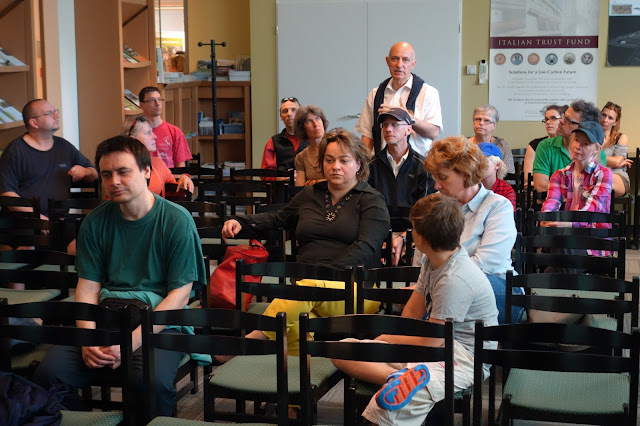 |
| Peter Dalos, operations manager of the Bubi system, presents at a spring, 2015 public hearing on bike-sharing in Szentendre. |
The nitty gritty of the study, funded by the CIVITAS Initiative, is summed up here.
But I also had some thoughts about it. On the positive side, we had outstanding involvement from City Hall: four or five staff members (including finance, infrastructure and communications experts) attended all of our meetings, and one event was attended by Szentendre's mayor. We also had the involvement of BKK, because one of our original ideas was that Szentendre's system could be an extension of the Bubi system in Budapest. It was one of eight alternatives that we explored.
As you can see in the study, the public was very supportive, with 76.1 percent of survey respondents fully or strongly in favour of introducing bike-sharing in Szentendre, and nearly half saying they would use the service at least occasionally.
 |
| Szentendre residents at the spring, 2015 public hearing raised several questions about the proposed scheme. |
There are ways to solve this. There are funding programmes that could help with the investment and there are opportunities for corporate sponsorship which could cover at least part of the operational costs. We even learned of a potential scheme organised by a passenger boat service that would implement bike sharing in riverside communities as a service for their customers.
Beyond that, there's the possibility to go with a low-tech, less expensive version of bike sharing. Although an e-bike system with automated docking stations is attractive, especially given Szentendre's hilly surroundings, the city could implement bike-sharing with standard bikes that could be rented out from a space at the city's HEV stop. The investment would be quite small -- just the bikes, a chip-card reader and a rudimentary shop. You would need staff to run it, as well. But this would be a very handy service for tourists coming up to the city by HEV or Volan bus, and in time it could be expanded and adapted to the needs of commuters (the Dutch OV-fiets system, run by the national rail company, is a good model).
In any case, we've handed the study over to City Hall, and the ball's in their court. There's evident will at City Hall to make Szentendre more bike and pedestrian friendly. It took some tentative steps in that direction this summer, and in our study we've argued that bike-sharing is a powerful tool to promote cycling -- not just on shared bikes, but on any bikes. We're hoping City Hall takes heart.





1 comment:
Why they all are sitting with the dull faces. software development company
Post a Comment